| Listing 1 - 10 of 16 | << page >> |
Sort by
|
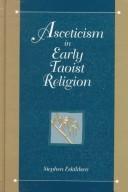
ISBN: 0585060096 9780585060095 0791439550 0791439569 9780791439555 9780791439562 1438402155 9781438402154 Year: 1998 Publisher: Albany : State University of New York Press,
Abstract | Keywords | Export | Availability | Bookmark
 Loading...
Loading...Choose an application
- Reference Manager
- EndNote
- RefWorks (Direct export to RefWorks)
Asceticism --- Taoism. --- Daoism --- Taouism --- Religions --- Tao --- Taoism --- S13A/0401 --- China: Religion--Popular religion: Taoism
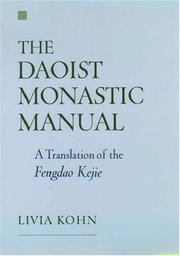
ISBN: 1280843675 0195346890 1429438444 9781429438445 9780195346893 9781280843679 0195170709 0197738788 9780195170702 0190291028 Year: 2004 Publisher: New York : Oxford University Press,
Abstract | Keywords | Export | Availability | Bookmark
 Loading...
Loading...Choose an application
- Reference Manager
- EndNote
- RefWorks (Direct export to RefWorks)
This title offers a complete annotated translation of the 'Fengdao Keije', accompanied by three introductory chapters that outline the development of Daoist organisations, discuss the date and compilation of the work, and introduce key issues of terminology and world view.
Taoist monasticism and religious orders. --- Taoism --- Monasticism and religious orders, Taoist --- Monasticism and religious orders --- Taoist monasticism and religious orders --- S13A/0401 --- S13A/0403 --- China: Religion--Popular religion: Taoism --- China: Religion--Rites, magic, festivals --- Monasticism and religious orders, Taoist.
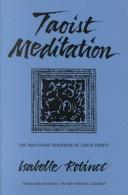
ISBN: 0585068291 9780585068299 0791413594 0791413608 1438417535 9781438417530 Year: 1993 Publisher: Albany, NY : State University of New York Press,
Abstract | Keywords | Export | Availability | Bookmark
 Loading...
Loading...Choose an application
- Reference Manager
- EndNote
- RefWorks (Direct export to RefWorks)
Book
ISBN: 9629968150 9789629968151 9789629966539 9629966530 Year: 2016 Publisher: Baltimore, Maryland : Baltimore, Md. : Project Muse, Project MUSE,
Abstract | Keywords | Export | Availability | Bookmark
 Loading...
Loading...Choose an application
- Reference Manager
- EndNote
- RefWorks (Direct export to RefWorks)
Over twenty-seven meters long, the Ordination Scroll of Empress Zhang (1493) is an important Ming Dynasty Daoist artifact from the San Diego Museum of Art's collection. It is a record of the imperial ordination of Empress Zhang (1470-1541), consort of the Ming Dynasty Hongzhi emperor (r. 1488-1505), by Zhang Xuanqing (d. 1509), the forty-seventh Heavenly Master of the Zhengyi institution. This book builds a history of imperial ordinations through a detailed examination of the scroll's transcriptions and meticulously painted images of celestial beings, and it examines the influences of the Daoist leaders known as the Zhengyi Heavenly Masters.
Taoist painting --- Painting, Taoist --- Painting --- Zhang huang hou, --- Ordination scroll of Empress Zhang. --- S13A/0401 --- S13A/0403 --- S05/0213 --- China: Religion--Popular religion: Taoism --- China: Religion--Rites, magic, festivals --- China: Biographies and memoirs--Ming
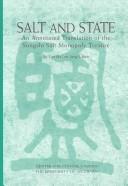
ISBN: 0892641630 0472901451 Year: 2004 Publisher: Ann Arbor : Center for Chinese Studies, University of Michigan,
Abstract | Keywords | Export | Availability | Bookmark
 Loading...
Loading...Choose an application
- Reference Manager
- EndNote
- RefWorks (Direct export to RefWorks)
From its inception in the Han dynasty (206 B.C.-220 A.D.), the salt monopoly was a key component in the Chinese government's financial toolkit. Salt, with its highly localized and large-scale production, was an ideal target for bureaucratic management. In the Song dynasty (960-1279), fiscal pressures on the government had intensified with increased centralization and bureaucratization. A bloated administration and an enormous standing army maintained against incursions by aggressive steppe neighbors placed tremendous strain on Song finances. Developing the salt monopoly seemed a logical and indeed urgent strategy, but each actor in this plan -- the emperor, local officials, monopoly administrators, producers, merchants, and consumers -- had his own interests to protect and advance. Thus attempts to maximize the effectiveness of the monopoly meant frequent policy swings and led to levels of corruption that would ultimately undo the Song. Unlike other contemporary sources, the 'Songshi' treatise organizes its subject into an intelligible and detailed narrative, elucidating special terminology, the bureaucracy and its processes, and debates relating to Chinese finance and politics, as well as the salt industry itself. Professor Chien's extensive annotation relies on parallel histories that corroborate and supplement the 'Songshi' account, together providing a comprehensive study of this important institution in China's premodern political economy. Cecilia Chien is Assistant Professor in the Division of Humanities at the Hong Kong University of Science and Technology.
Government monopolies --- Salt industry and trade --- History. --- Song shi. --- China --- History --- Nonmetallic minerals industry --- Monopolies, Government --- State monopolies --- Government business enterprises --- Government ownership --- Monopolies --- Monograph on salt in the Shihuozhi of the Songshi --- Songshi salt monopoly treatise --- S10/0401 --- China: Economics, industry and commerce--Salt monopoly (incl. Yantielun)
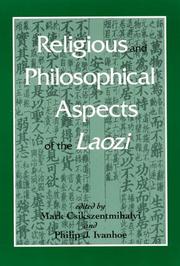
ISBN: 0791441113 0791441121 9780791441121 0585092907 9780585092904 1438400128 Year: 1999 Volume: *5
Abstract | Keywords | Export | Availability | Bookmark
 Loading...
Loading...Choose an application
- Reference Manager
- EndNote
- RefWorks (Direct export to RefWorks)
Leading scholars examine religious and philosophical dimensions of the Chinese classic known as the Daodejing or Laozi.
Taoism --- Taoist philosophy. --- Filosofie [Taoïstische ] --- Philosophie taoïste --- Philosophy [Taoist ] --- Taoist philosophy --- S12/0500 --- S13A/0401 --- Philosophy, Taoist --- Philosophy --- China: Philosophy and Classics--Laozi and Taoism (incl. Daodejing) --- China: Religion--Popular religion: Taoism --- Laozi. --- Lao-tzu. --- 老子. --- China --- Lao Zi --- PHILOSOPHY, CHINESE --- LAOZI --- PHILOSOPHY --- Philosophy, Chinese --- Laozi --- Philosophy, chinese
Book
ISBN: 0824813596 0824880846 Year: 1991 Publisher: University of Hawai'i Press
Abstract | Keywords | Export | Availability | Bookmark
 Loading...
Loading...Choose an application
- Reference Manager
- EndNote
- RefWorks (Direct export to RefWorks)
S13A/0403 --- S13A/0401 --- China: Religion--Rites, magic, festivals --- China: Religion--Popular religion: Taoism --- Ordination (Liturgy) --- Ordination of women --- Taoism --- Ordination --- Liturgics --- Sacraments (Liturgy) --- Women, Ordination of --- Women clergy --- Rituals --- Liturgy --- Yü-chen, --- Chin-hsien, --- Jinxian gong zhu, --- Chin-hsien kung chu, --- Princess Gold-Immortal, --- Taoism. --- Rituals. --- Yuzhen, --- Princess Jade-Perfected, --- Yü-chen kung chu, --- Yuzhen gong zhu,
Book
ISBN: 9780231184441 0231184441 9780231545495 0231545495 Year: 2018 Publisher: New York, NY
Abstract | Keywords | Export | Availability | Bookmark
 Loading...
Loading...Choose an application
- Reference Manager
- EndNote
- RefWorks (Direct export to RefWorks)
During the Tang dynasty (618-907), changes in political policies, the religious landscape, and gender relations opened the possibility for Daoist women to play an unprecedented role in religious and public life. Women, from imperial princesses to the daughters of commoner families, could be ordained as Daoist priestesses and become religious leaders, teachers, and practitioners in their own right. Some achieved remarkable accomplishments: one wrote and transmitted texts on meditation and inner cultivation; another, a physician, authored a treatise on therapeutic methods, medical theory, and longevity techniques. Priestess-poets composed major works, and talented priestess-artists produced stunning calligraphy.In Gender, Power, and Talent, Jinhua Jia draws on a wealth of previously untapped sources to explain how Daoist priestesses distinguished themselves as a distinct gendered religious and social group. She describes the life journey of priestesses from palace women to abbesses and ordinary practitioners, touching on their varied reasons for entering the Daoist orders, the role of social and religious institutions, forms of spiritual experience, and the relationships between gendered identities and cultural representations. Jia takes the reader inside convents and cloisters, demonstrating how they functioned both as a female space for self-determination and as a public platform for both religious and social spheres. The first comprehensive study of the lives and roles of Daoist priestesses in Tang China, Gender, Power, and Talent restores women to the landscape of Chinese religion and literature and proposes new methodologies for the growing field of gender and religion.
Priesterin. --- Tangdynastie. --- Taoism --- Taoism. --- Taoismus. --- Taoist women --- Taoist women. --- History. --- China. --- Women, Taoist --- Women --- History --- S04/0630 --- S11/0710 --- S13A/0401 --- China: History--Sui and Tang: 589 - 907 --- China: Social sciences--Women and gender: general and before 1949 --- China: Religion--Popular religion: Taoism --- China
Book
ISBN: 9780674241107 067424110X 9781684171040 1684171040 Year: 2019 Publisher: Boston, Massachusetts : Harvard University Asia Center,
Abstract | Keywords | Export | Availability | Bookmark
 Loading...
Loading...Choose an application
- Reference Manager
- EndNote
- RefWorks (Direct export to RefWorks)
"Addresses the concept of truth in Chinese Daoist philosophy and ritual. Through wide-ranging research into Daoist ritual, both in history and as it survives in the present day, shows that the concept of true reality that informs this tradition posits being as a paradox anchored in the inexistent Way"--Provided by publisher.
Metaphysics --- Comparative religion --- Taoism --- China --- Truth --- Taoist philosophy --- S12/0500 --- S13A/0401 --- Philosophy, Taoist --- Philosophy --- Daoism --- Taouism --- Religions --- Tao --- Conviction --- Belief and doubt --- Skepticism --- Certainty --- Necessity (Philosophy) --- Pragmatism --- Religious aspects --- Rituals --- China: Philosophy and Classics--Laozi and Taoism (incl. Daodejing) --- China: Religion--Popular religion: Taoism --- Ritual. --- Taoism. --- Taoismus. --- Taoist philosophy. --- Wahrheit. --- Rituals. --- Religious aspects&delete&
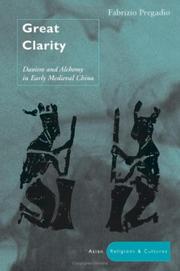
ISBN: 0804767734 1429415991 9781429415996 9780804751773 0804751773 9780804767736 Year: 2006 Publisher: Stanford, Calif. : Stanford University Press,
Abstract | Keywords | Export | Availability | Bookmark
 Loading...
Loading...Choose an application
- Reference Manager
- EndNote
- RefWorks (Direct export to RefWorks)
Fabrizio Pregadio extensively examines the religious aspects of Chinese alchemy. The main focus is the relation of alchemy to the Daoist traditions of the early medieval period (third to sixth centuries).
Taoism --- Alchemy --- Metals, Transmutation of --- Philosophers' egg --- Philosophers' stone --- Stone, Philosophers' --- Transmutation of metals --- Chemistry --- Occultism --- History. --- China --- Religion. --- S13A/0450 --- S13A/0401 --- S19/0400 --- China: Religion--Astrology, fortune-telling, physiognomy, occultism, numerology, divination --- China: Religion--Popular religion: Taoism --- China: Natural sciences--Chemistry (incl. alchemy) --- Daoism
| Listing 1 - 10 of 16 | << page >> |
Sort by
|

 Search
Search Feedback
Feedback About UniCat
About UniCat  Help
Help News
News